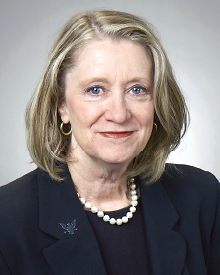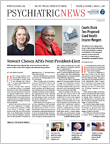Are you burned out? Exhausted and demoralized by administrative demands and regulatory requirements that take you away from the satisfaction that comes with patient care?
APA wants to hear about it. APA President-elect Anita Everett, M.D., will chair “Physician Wellness and Burnout: A Town Hall Discussion With APA Leadership” at this year’s Annual Meeting in San Diego. Also joining in the town hall discussion will be APA CEO and Medical Director Saul Levin, M.D., M.P.A., and Trustee-At-Large Richard Summers, M.D.
In an interview with Psychiatric News, Everett said professional burnout is a significant issue affecting physicians in all disciplines, impacting health and quality of life and the quality of care they provide. “We want to target the town hall to APA members who may be experiencing some degree of burnout,” she said. “We would like to be able to quantify some of what members are experiencing, collect information, and later survey members so we understand the extent of the problem and the numbers of people affected by it.”
Everett emphasized that the phenomenon of burnout exists across a continuum from routine fatigue to extreme depression. “At the extreme end, physicians become so demoralized that it impairs functioning and becomes a form of pathology requiring treatment. But we want to make clear that we see this problem encompassing a spectrum of severity.”
A substantial body of literature has already documented the extent of the problem across disciplines. A December 2015 report in Mayo Clinic Proceedings found that in 2014 46.9 percent of U.S. physicians reported high emotional exhaustion, 34.6 percent high depersonalization, and 16.3 percent a low sense of personal accomplishment. In aggregate, 54.4 percent of the physicians had at least one symptom of burnout based on a high emotional exhaustion score and/or a high depersonalization score. Only 40.9 percent of the physicians felt that their work schedule left enough time for personal/family life. When compared with 2011, rates of burnout among physicians were higher in 2014 and satisfaction with work-life balance was lower (40.9 percent versus 48.5 percent).
A 2013 report by the Rand Corporation, sponsored by the AMA, looked at factors associated with physician satisfaction and wellness, and those associated with burnout and exhaustion. Among the key findings:
•
Excessive productivity quotas and limitations on the time spent with each patient were major sources of physician dissatisfaction. The cumulative pressures associated with workload were described as a “treadmill” and as being “relentless,” sentiments especially common among primary care physicians.
•
Physicians described the cumulative burden of rules and regulations as being overwhelming and draining time and resources away from patient care.
•
Perceptions of collegiality, fairness, and respect were key factors affecting whether physicians were satisfied. Within the practices studied, frequent meetings with other doctors and other health professionals fostered greater collegiality and satisfaction.
Summers, who was appointed by Everett to chair the Work Group on Psychiatrist Well-Being and Burnout during Everett’s presidential year, said opportunities exist to enhance physician wellness through research, education, and intervention. “APA leadership wants to hear from members regarding drivers of burnout, strategies for promoting wellness, and factors that contribute to professional satisfaction,” he said. “I hope members will attend [this town hall session] because they will have the chance to express their concerns and ideas directly to APA leadership.”
He added, “My hope for the work group going forward is that we will review what we know about psychiatrist well-being and burnout and provide educational materials, self-assessment tools, and potential interventions for our members. We will make recommendations for APA activities in this area, including taking a leadership role in providing information about effective interventions for burnout and depression to our colleagues in other specialties.” ■
“Physician Wellness and Burnout: A Town Hall Discussion With APA Leadership” will be held Sunday, May 21, from 10 a.m. to 11:30 a.m. in Room 30B of the San Diego Convention Center. “Changes in Burnout and Satisfaction With Work-Life Balance in Physicians and the General US Working Population Between 2011 and 2014” can be accessed
here. “Factors Affecting Physician Professional Satisfaction and Their Implications for Patient Care, Health Systems, and Health Policy” is available
here.

